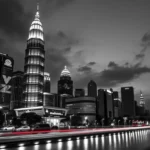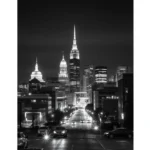Dream of City the Duality of Urban Life: Exploring the Complexities of City Living

Introduction
The dream of city is a powerful and complex phenomenon that has captivated the human imagination for centuries. As we navigate the ever-evolving urban landscape, we are confronted with the duality of urban life – the allure of opportunity and progress, juxtaposed with the challenges of overcrowding, pollution, and social inequality. This blog post delves into the depths of this dream, exploring the multifaceted nature of city living and the insights it can offer into the human experience.
The dream of city is a reflection of our collective aspiration for growth, connection, and fulfillment. It represents the promise of a vibrant, dynamic environment where opportunities abound and the boundaries of our potential seem limitless. Yet, this dream is often tempered by the realities of urban life, where the pursuit of progress can come at a cost to our well-being and the harmony of our communities.
The Allure of the City
The dream of city is fueled by the promise of a better life – a life filled with endless possibilities, cultural diversity, and the thrill of constant change. For many, the city represents a gateway to a world of opportunity, where they can pursue their dreams, expand their horizons, and connect with a vast network of people and ideas.
The city’s duality of urban life is often embodied in its vibrant energy and the sense of possibility it engenders. The bustling streets, towering skyscrapers, and the hum of activity can evoke a feeling of excitement and potential, luring individuals from all walks of life to seek their fortunes within its boundaries.
Moreover, the city offers a rich tapestry of cultural experiences, from world-class museums and performing arts venues to diverse culinary offerings and lively nightlife. This cultural abundance can be a powerful draw for those seeking intellectual and creative stimulation, as well as a sense of belonging within a larger community.
The Challenges of City Living
However, the dream of city is not without its challenges. The duality of urban life becomes increasingly apparent as we grapple with the realities of overcrowding, pollution, and social inequality that often plague urban centers.
The sheer density of population in many cities can lead to a sense of overwhelming stimulation, where the constant noise, traffic, and crowds can become overwhelming, eroding our sense of personal space and contributing to feelings of isolation and stress.
Additionally, the environmental impact of city living, from the emission of greenhouse gases to the depletion of natural resources, can have far-reaching consequences on the health and well-being of urban residents. The prevalence of air and water pollution, as well as the lack of green spaces, can have a detrimental effect on both physical and mental health.
Furthermore, the duality of urban life is often manifested in the stark divide between the haves and the have-nots. The concentration of wealth and resources in urban centers can exacerbate social inequalities, leading to the marginalization of certain communities and the perpetuation of systemic barriers to upward mobility.
Navigating the Complexities of City Living
As we grapple with the duality of urban life, it is essential to develop a nuanced understanding of the city and its impact on our lives. This understanding can help us navigate the complexities of city living and find ways to harness the dream of city while mitigating its challenges.
One key aspect of this navigation is the recognition that the dream of city is not a one-size-fits-all experience. Each individual’s relationship with the city is shaped by their unique circumstances, backgrounds, and perspectives. What may be a fulfilling and enriching experience for one person might be overwhelming and alienating for another.
By acknowledging this diversity of experiences, we can begin to explore the ways in which the duality of urban life manifests in our own lives. This might involve reflecting on our personal values, priorities, and coping mechanisms, and how they align (or clash) with the realities of city living.
Moreover, it is crucial to consider the broader societal and environmental implications of urban development. As individuals, we can advocate for sustainable and equitable urban planning, supporting initiatives that prioritize green spaces, affordable housing, and the empowerment of marginalized communities.
Embracing the Complexity of the City
The dream of city is a multifaceted and ever-evolving concept, one that reflects the complex and often contradictory nature of human experience. As we navigate the duality of urban life, it is essential to embrace the nuances and complexities that underlie this dream.
By doing so, we can gain a deeper understanding of ourselves, our communities, and the world around us. The dream of city might represent a path to personal and professional fulfillment for some, while for others, it might signify a constant struggle to find balance and meaning amidst the chaos.
Ultimately, the dream of city is not a singular, universal experience, but rather a tapestry of diverse narratives and perspectives. By acknowledging and engaging with this complexity, we can cultivate a more holistic and empathetic understanding of the urban experience, and work towards creating cities that are truly inclusive, sustainable, and enriching for all who call them home.
Conclusion
The dream of city is a powerful and multifaceted concept that reflects the human desire for growth, connection, and opportunity. However, the duality of urban life reminds us that this dream is often tempered by the challenges of city living, from environmental degradation to social inequality.
By embracing the complexities of the urban experience, we can navigate the duality of urban life with a greater sense of understanding and purpose. This involves reflecting on our personal values and circumstances, advocating for sustainable and equitable urban development, and cultivating a more holistic and empathetic perspective on the diverse narratives that shape the dream of city.
As we continue to grapple with the evolving nature of city living, let us remain open to the nuances and contradictions that lie at the heart of the dream of city. In doing so, we can work towards creating urban environments that truly fulfill our aspirations for growth, connection, and fulfillment, while also addressing the pressing social and environmental challenges that confront us.








